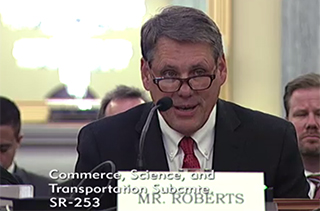At a Senate hearing Wednesday to examine the state of the U.S. maritime industry, witnesses discussed efforts to weaken the Jones Act in Puerto Rico, U.S. oil exports and LNG.
Michael Roberts, senior vice president and general counsel, Crowley Maritime Corp., testified about efforts to develop a legislative package to help stabilize Puerto Rico’s economy. He told members of the Surface Transportation and Merchant Marine Infrastructure, Safety and Security Subcommittee that some have used it as an opportunity to urge that a Jones Act exemption for Puerto Rico be included in the package.
“They have offered no credible proof that such a change would help Puerto Rico, and we are confident it would do more harm than good both for Puerto Rico and for the country generally. Such a change would put at risk the reliable, efficient service the island currently receives, as well as hundreds of private sector jobs on the island, with no offsetting gains. It would also send a chilling message that would bring further investment in vessels built in U.S. shipyards to a standstill.”
Roberts also discussed another big issue in Puerto Rico — the high cost of electricity. This is partly a result of its island location, limited market size, and also due to concerns with the government-owned utility, PREPA, he said. “The high electricity cost not only hits consumers on the island, but also key employers on the island – manufacturers and other industrial facilities that have high energy usage,” he testified. “To help such employers reduce the cost and improve the reliability of their electrical service, Crowley subsidiary Carib Energy began a small-scale LNG supply business to customers on the Island. Carib provides LNG using 40' ISO tanks, which are filled up at a natural gas plant on the mainland, and shipped to the customers’ facility in Puerto Rico.”
Roberts didn’t suggest that this was a long-term suitable method for supplying LNG to PREPA, which currently purchases bulk LNG primarily under contract with a supplier in nearby Trinidad, but “if and when PREPA seeks new bulk LNG supply contracts, it can ask for bids from U.S. suppliers knowing that American bulk LNG vessels will be available to provide an efficient and cost-effective service when needed. Allegations that shipping costs would materially increase the cost of U.S.-sourced LNG to the island are unfounded.”
Klaus Luhta, chief of staff with the International Organization of Master, Mates, & Pilots, told lawmakers that exports of LNG from the U.S. creates a “tremendous opportunity to increase the size of the U.S.-flag commercial fleet and to provide much-needed new employment opportunities for American mariners.”
Luhta said the Department of Transportation should be required to report to Congress on the steps taken to develop and implement a program to promote the carriage of LNG exports on U.S.-flag LNG vessels.
He also urged the subcommittee to address a major competitive disadvantage to operating a U.S.-flag versus a foreign-flag LNG vessel. This would be done by extending the provisions of section 911 of the Internal Revenue Code (the foreign source income 10 exclusion) to U.S. mariners that work aboard LNG vessels engaged in the carriage of LNG exports from the U.S.
Crowley’s Roberts also discussed the change in the law that now permits U.S. crude oil exports. He told subcommittee members that the change has created “uncertainty in the domestic tanker industry.”
Crude oil’s share of domestic tanker transportation volumes jumped from less than 10% five years ago to more than 30% today, Roberts said. “An important question in the maritime industry is the extent to which this change will cause a reduction in domestic trading volumes, and thereby adversely impact the investments in new tonnage, some of which has yet to come on line.”
The first hearing in this series on March 8 examined the federal role in the U.S. maritime industry.




